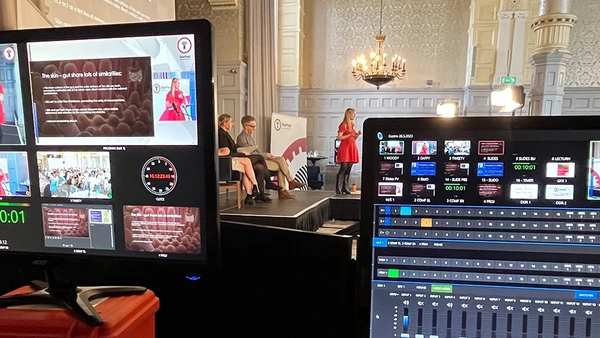What are Hybrid Events?
So, what exactly are hybrid events? Key facts that you need to know in 2024.

In today's increasingly connected world, events are evolving to reach broader audiences, foster deeper engagement, and cater to diverse preferences. This is where hybrid events come in, blending the physical and digital realms to create unique and inclusive experiences.
So, what exactly are hybrid events?
Imagine a conference where attendees can participate both in-person and virtually. Speakers present live on stage, while online participants watch a seamless livestream and interact through chat rooms, Q&A sessions, and virtual booths. This is the essence of a hybrid event – combining the energy and connection of in-person gatherings with the accessibility and reach of online participation.
Hybrid events offer a versatile solution for programs that can effectively occur both in-person and virtually. Let's dive into the differences between internal and external hybrid events and some of the most common examples of each.
INTERNAL EVENTS:
Internal events are programmes that are held to benefit your company’s internal stakeholders, including employees, leadership, staff, etc. For many companies, it is nearly impossible to gather all your internal stakeholders in the same room for a meeting.
This is where hybrid events come into play. Pick a venue for your event, like your company's headquarters, and then live stream the meeting to the rest of your company.
Below are some examples of common internal hybrid events:
- Global town halls
- All hands meeting
- International meetings
- Training seminars
- Company spirit events
- Internal celebrations
EXTERNAL EVENTS:
External events are programmes that are targeted toward your customers, prospects, clients, etc. Transitioning your live external event to a hybrid setting can help draw in more attendees and lower your carbon footprint.
External events that can be made hybrid include the following:
- Conferences and trade shows
- Customer conferences
- Product demonstrations
Purpose of hybrid events:
While all of your events have individual goals, an overarching goal for all hybrid events is to engage as many attendees as possible, regardless of how they may be participating. A hybrid event allows people to connect in person if they want that human connection experience while also giving individuals who cannot attend in person the flexibility to engage virtually.
The goal is to make the experience equally riveting for both groups. By reducing the barrier to entry, hybrid events provide the opportunity for even more people to interact with your content and your brand.
Below are some of the most significant advantages of making your event hybrid.
- Increase attendance
- Enhanced content engagement
- Lower carbon footprint
- Increased sponsorship value
- Marketing reach
By understanding these types of hybrid events and carefully considering your specific needs, you can create an engaging and impactful experience that transcends physical boundaries and connects with your audience like never before.
Start planning your hybrid events today. Get in touch to take your 2024 events to the new level.

Leveraging 4 years in sales and marketing, Vipul brings valuable connections and commercial acumen to Stream7. His experience working with dynamic sports and media organisations in the UK and India, coupled with event marketing expertise and an entrepreneurial mindset, makes him a perfect fit for the Business Development Executive role.
All author postsLatest Posts
Streamlining Hybrid Events: How Hotels And Venues Can Thrive And Monopolise In The New Normal
Decode seamless hybrid conferences with Stream7. Learn how we create engaging, tech-powered events that boost reach, cut costs, and drive results.
So, what exactly are hybrid events? Key facts that you need to know in 2024.
Stream7, with over a decade of experience in live streaming events, understands the intricacies and challenges of venturing into the realm of hybrid events.



